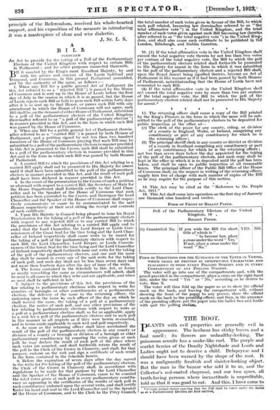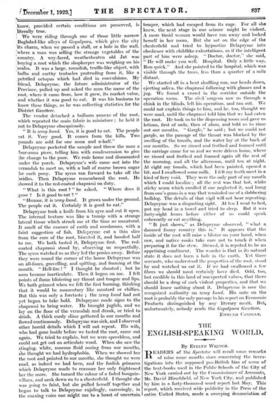THE ROOT.
PLANTS with evil properties are generally evil in appearance. The henbane has sticky leaves and a foul smell ; its flowers are unhealthy-looking. The poisonous aconite has a snake-like curl. The purple and scarlet berries of the Deadly Nightshade and Lords and Ladies ought not to deceive a child. Delapryme and I should have been warned by the shape of the root. It was a malignantly freakish and sinister-looking object. But the man in the bazaar who sold it to us, and the Collector's red-coated chaprassi, and our two syees, all truth-loving persons where inexactitude is unprofitable, told us that it was good to eat. And this, I have come to • Certain formal clauses enacting that the Poll shall be taken under the Ballot SA at. a Parliamentary Election aro hero omitted, know, provided certain conditions are preserved, is literally true.
We were riding through one of those little narrow Baghdad-like alleys of Gopalpura, which give the city !its charm, when we passed a stall, or a hole in the wall, where a man was selling the strange vegetables of the country. A wry-faced, weatherbeaten old Jat was buying a root which the shopkeeper was weighing on his scales. It was a large, roundish, truffle-like object, with bulbs and earthy tentacles protruding from it, like a petrified octopus which had died in convulsions. My friend, Delapryme, the future administrator of the Province, pulled up and asked the man the name of the root, where it came from, how it grew, its market value, and whether it was good to eat. It was his business to know these things, as he was collecting statistics for the District Gazetteer.
The vendor detached a bulbous annexe of the root, which repeated the. main fabric in miniature ; he held it out to Delapryme obsequiously.
It is zemy kund. Yes, it is good to eat. The people eat it. Very good. It conies from the hills. Two pounds are sold for one anna and a-half."
Delapryme pocketed the sample and threw the man a four-anna, piece, telling him with condescension to give the change to the poor. We rode home and dismounted 'under the porch. Delapryme's wife came out into the verandah to meet us, with a ball of coarse brown sugar for each pony. The syces ran forward to take off the ,bridles. Then Delapryme remembered the root. He iliowed it to the red-coated chaprassi on duty.
" What is this root ? " he asked. " Where does it ;grow ? Is it good to eat ? "
"Huzoor, it is zemy kund. It grows under the ground. The people eat it. Certainly it is good to eat."
Delapryme took a knife from his syce and cut it open. The internal texture was like a turnip with a strange lateral tissue which struck me at the time as unnatural.
It smelt of the essence of earth and mushroom, with a faint suggestion of fish. Delapryme cut a thin slice from the core of the root, bisected it, and handed half to me. We both tasted it, Delapryme first. The red- coated chaprassi stood by, observing us respectfully.
The syces watched us as they led the ponies away. Before they were round the corner of the house Delapryme was on all-fours, grovelling, and spitting, and foaming at the mouth. " Hell-fire ! " I thought he shouted ; but he soon became inarticulate. Then it began on me. I felt points of flame blistering my throat and tongue and lips. We both grinned when we felt the first burning, thinking that it would be momentary like mustard or chillies. '
But this was only a foretaste ; the zemy kund had not yet begun to take hold. Delapryme made signs to the chaprassi to bring water. He brought jugfuls, and we lay on the floor of the verandah and drank, or tried to drink. A thick curdy slime gathered in our mouths and flowed continuously. Delapryme was sick, and I observed other horrid details which I will not repeat. His wife, who had gone inside before we tasted the root, came out again. We tried to explain, but we were speechless, and could not get out an articulate word. When she saw the stinging, white, mucous fluid oozing from our mouths, she thought we had hydrophobia. When we showed her the root and pointed to our mouths, she thought we were mad, as indeed we had been, and the foolish grimaces which Delapryme made to reassure her only frightened her the more. She turned the colour of a faded bougain- villaea, and sank down on to a chesterfield. I thought she was going to faint, but she pulled herself together and began to talk to Delapryme cajolingly, caressingly, in the coaxing voice one might use to a beast of uncertain temper, which had escaped from its cage. For all she knew, the next stage in our seizure might be violent. A more timid woman would have run away and locked herself in her room. But she sat on the edge of the chesterfield and tried to hypnotize Delapryme into obedience with childlike-exhortations, as if the intelligent part of him were asleep. " Doctor, doctor," she said, " He will make you well. Hospital. Only a little way.- Run quick." And she pointed to the hospital, which was visible through the trees, less than a quarter of a mile distant.
We started off in a bent shuffling run, our heads down. ejecting saliva, the chaprassi following with glasses and a jug. We found a crowd in the corridor outside the operation room. The civil 'surgeon saw us through a chink in the blinds, left his operation, and ran out. We could not explain things to him, and he, too, thought we were mad, until the chaprassi told him that we had eaten the root. He took us to the dispensing room and gave us lotions, first of soda, then of alum, and told us to rinse out our mouths. " Gargle," he said ; but we could not gargle, as the passage of the throat was blocked by the swelling of the tonsils, and the water lay at the back of our mouths. So we rinsed and frothed and foamed until the carriage came for us and we were driven home, where we rinsed and frothed and foamed again all the rest of the morning, and all the afternoon, until ten at night. At eight my tonsils, which had been painted, opened a bit, and I swallowed some milk. I felt my teeth meet in a kind of fiery void. They were the only part of my mouth which I could localize ; all the rest was that hot, white sticky scum which curdled if one neglected it, and hung from one's gums in a way that reminded me of a slobbering bulldog. The details of that vigil will not bear repeating. Delapryme was a disgusting sight. At ten I went to bed, put my head in a towel and tried to sleep. But it was forty-eight hours before either of es could speak coherently or eat anything.
" It just shows," as Delapryme observed, " what a damned funny country this is." It appears that the inside of the root will raise a blister on your hand, when raw, and native cooks take care not to touch it when preparing it for the stew. Stewed, it is reputed to be an appetising condiment. The wonder. is that in its natural state it does not burn a hole in the earth. Yet three servants, who understood the properties of the root, stood by and watched us eat it. If we had swallowed a few fibres we should most certainly have died. Odd, too, but credible in this land of unexpected values, that there should be a drug of such violent properties, and that we should know • nothing about it. Delapryme is now the recognized authority on zemy kund. His note on the root is probably the only passage in his report on Economic Products distinguished by any literary merit. But unfortunately, nobody reads the Gopalpura Gazetteer.
EDMUND CANDLER.



























































 Previous page
Previous page